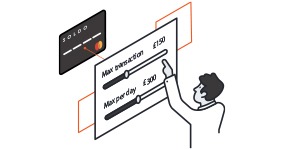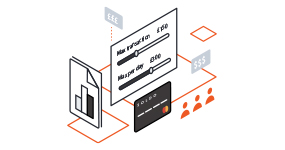The complete guide to prepaid cards for businesses
A few things to consider before switching to prepaid cards for business expenses.
Get started Contact salesA few things to consider before switching to prepaid cards for business expenses.
Get started Contact salesAccess lower fees while saving time spent on accounting by joining Soldo today.

Manage spending on prepaid cards
Empower employees to spend responsibly; define budgets and track spending in real time, from anywhere.

Automate your expense admin
Stream transactions, receipts, and other data right into your accounting software through smart integrations.

Effortless bookkeeping
Track in real time on desktop and mobile; flow data into accounting systems automatically.
Let’s start with a definition: what is a prepaid card? Simply put, it’s a payment card onto which you load a certain amount of money, and then make payments with that card up to that pre-set budget. Then you top up the balance or transfer more funds as needed. So it can be used similarly like debit or a credit cards, but it isn’t linked directly to a bank account.
In fact, the primary appeal of prepaid cards is in the ways that they differ from business credit cards. Because prepaid cards aren’t linked directly to a bank account or credit facility, there’s no interest added to purchases, and there’s no accumulation of debt. And because you’re not asking for credit, prepaid cards are much easier to get hold of.
That last point is crucial. Many small businesses are turned down for business credit cards because they’re relatively new, so prepaid cards become a much more accessible option.
Even if you have (or are eligible for) a business credit card, there are still many good reasons to embrace prepaid business cards.
As this guide will show, prepaid cards can be a game changer when it comes to expense management, and they’re an excellent way to empower employees with controlled access to company money.
With prepaid cards increasing in popularity, providers are trying to stand out from the crowd and offer packages that are unique in their field. As such, not all prepaid cards for businesses are the same.
For a start, different issuing companies charge different fees. As you embark on your prepaid card journey, it’s worth taking a moment to learn about the landscape of fees, because it should influence your choice. Typical fees include:
Most cards charge a number of these fees, so different cards will be more suitable for different businesses, depending on what you use them for.
With prepaid cards there can be various thresholds you’re expected to adhere to. For example, many providers specify a maximum amount you can hold on a prepaid card, which could be anything up to £25,000. Some have minimum balance requirements, typically £50 or £100, and they can also include a maximum daily transaction cost or a maximum single purchase value. Much like fees associated with prepaid cards, minimums and maximums will affect your decision too.
Are you eligible for a prepaid card for business?
The answer to this question is almost certainly yes. As we mentioned previously, prepaid cards are generally more accessible than credit or debit cards. Proof of identification is all you’ll usually need to provide, alongside some basic company details, and there’s no need to share your credit history.
What to look for in a prepaid card for business?
The best card for your business will depend on how you’re planning on using it. Here’s a few factors to consider:
Prepaid business cards aren’t just a last resort for those who can’t get credit. In fact, many companies now use prepaid cards alongside a company credit card, and there are a number of features that a good card issuer will provide.
Paying by card is convenient, and some prepaid card providers also issue virtual cards for online purchases. The controlled allocation of real money makes budgeting easy, with no risk of nasty surprises at the end of the month. It’s also reassuring to know that your business can never lose more than the amount loaded onto the cards.
Most prepaid solutions also give you the option to turn cards off with a click. A lost, stolen or fraudulently used card can be deactivated in seconds.
Employees who need to travel can get a prepaid travel card (also known as a cash passport) to make the costs associated with international travel easier to manage. As well as expenses like accommodation and food, prepaid travel cards are useful when it comes to the unforeseen costs of a trip. These cards are also compatible with multiple currencies, and eliminate the need to carry wads of cash.
However, be sure to check what the foreign exchange fee is when researching a prepaid card. With Soldo Pro and Premium, for example, the charge for currency exchange services is fixed at 1.00% above the latest available interbank rate.
Allocating prepaid cards to employees gives them the autonomy to make purchases at their discretion, while you decide budgets, so there aren’t any unexpected outgoings. Significantly, it also means that employees won’t have to spend their own money on the company’s behalf.
Making employees pay for business expenses from their own pockets can leave them frustrated at least, and even in financial difficulty. The best prepaid cards give employees freedom to spend company money within a pre-established limit.
The downsides of prepaid business cards
Prepaid cards are a useful tool for many businesses, but they do have downsides:
Although these downsides are worth knowing, the pros of prepaid cards far outweigh the cons, and prepaid cards can help to push your business forward. First, choose a Soldo Prepaid Card that fits your business.
When researching prepaid cards, you may see the term ‘prepaid debit card’ or ‘prepaid credit card’ used. They both mean the same thing, it’s just a matter of semantics. However, when compared to traditional credit and debit cards, there are varying differences.
The most obvious advantage prepaid cards have over credit cards is one we’ve already mentioned: it’s much easier to get an account because a credit check isn’t necessary.
And with a prepaid card, you never risk debt spiralling out of control.
Research shows that people find it easier to spend excessively on credit cards than with cash, and prepaid cards are much closer to cash. When the loaded sum is spent, it’s spent.
You are also spending company money that already exists, rather than building up debt that will need to be paid off in future. If multiple employees are spending money on your company’s behalf without limits, it’s easy to rack up debt.
Prepaid cards offer a couple of key benefits over debit cards as well.
For starters, the spending is risk-free. It can be dangerous to issue multiple employees with debit cards, especially if you have an overdraft facility. Having direct access to a bank account will always be less secure than having a pre-set limit.
Another bonus of loading cards with preset amounts is that you make accurate budgeting easy. You can get a real-time view of spending, which isn’t always possible with debit cards.
Prepaid cards are as much a management tool as a spending system. They allow you to take control of your business spending and focus it in more productive ways.
The best prepaid systems come with features designed to make your financial processes as efficient as possible. These include:
It’s proactive expense management at your fingertips. Get started here.
Many prepaid cards integrate seamlessly with accounting software, making the lives of your finance staff easier. Soldo integrates directly with QuickBooks and Xero, for example.
Manual data entry is error-prone, leading to inaccurate records and missed VAT deadlines. Prepaid card management systems automatically send data to accounting software, which results in more accurate accounts. And they can be reconciled in just a couple of clicks!
Prepaid cards give you greater visibility on your spending, as well as the insight you need to spend more wisely. A couple of features that are extremely useful for managing business spending are:
Prepaid cards don’t just make life easy for you, but for your employees as well:
Soldo’s prepaid Mastercard® offers all the benefits we’ve mentioned in this guide.
Our cards let you take control of company spending while simplifying expense reporting. Soldo’s spend management platform offers great money-saving insight and makes bookkeeping effortless with accounts software integration.
Soldo’s prices are straightforward. There are no hidden deposit or transaction fees and we don’t insist on a minimum number of cards or a minimum deposit. Our foreign exchange fee is fixed at just 1% for Pro and Premium plans. There’s just a small monthly fee per card for Pro and Premium plans.
Signing up is easy and you can order as many cards as you’d like. You can have a virtual card up and running in less than one working day, and physical cards in less than five. Upgrade to Soldo today and optimise your business’ finances.
Yes. You aren’t asking for a line of credit, so your credit score doesn’t come into it. To get started, you just need to have a registered company and provide details for the company director and admin of your Soldo account.
Once you complete the simple application procedure your Soldo cards should arrive in 2 – 5 days. Load them up, create controls, and you’re all set.
Soldo’s plastic Mastercard® debit cards can be used abroad, just like any other debit card. Soldo’s Mastercard® debit cards are issued in either GBP, EUR, or USD. Company wallets can be set up in GBP, EUR or USD so you can manage your offices around the world in local currency.
All prepaid cards have the same basic functionality, but only a few have the data management capabilities needed to integrate with popular accounting software.
Those that do, like Soldo, can export and import transaction data to Quickbooks and other accounting apps. Soldo’s payment console also seamlessly integrates with Xero, including its automatic bank feed and accounting APIs.
This is particularly useful for accountants, as they’ll be able to get a closer insight into how and where your money is being spent and offer answers for how to make things run a little more smoothly.